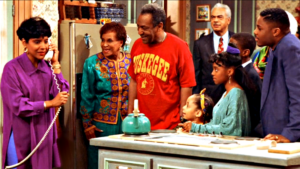
30 Years of The Cosby Show: More than just sweaters

The Cosby Show’s reputation increases a little bit every year. Maybe that’s because in retrospect, we can see how unique it was.
Sept. 20 is the 30th anniversary of the first episode of The Cosby Show — also known as “the one that was shot on a completely different set from the rest of the series” — and it seems like every time the show has an anniversary, it gets a little more fondly remembered and a little closer to classic status. That wasn’t guaranteed. Its immense success naturally sparked a backlash, especially when the The Simpsons went up against the declining Cosby on Thursdays, and it seemed like Bill and Bart were facing off in a sort of generational war. It never made a lot of noise in syndication, though I couldn’t tell you why; other family sitcoms, and other black family sitcoms like The Jeffersons and Fresh Prince of Bel Air, seemed to have more of an impact in reruns.
The show was also sometimes criticized or mocked for its celebration of wealth and its emphasis on Cosby’s own personal obsessions, from the importance of college to the greatness of elderly jazz musicians. It seemed for a while like it might be remembered as a show that was very popular at the time but was a relic of the ’80s, like NBC’s other family hit of the era, Family Ties. Instead its reputation quietly seems to have grown, both artistically and socially. It isn’t quite remembered as a masterpiece like the other big hit of its production company, Roseanne, but it inspires a similar kind of revival as a show that you could never make today.
It helps that the early seasons of The Cosby Show are the best, so when you watch it from the beginning, it puts its best foot forward. The pilot features probably the most famous and iconic scene of the series, in which Cosby confronts his son over his bad report card (and mocks Theo’s argument that he should be just be accepted and loved for the underachiever he is). It’s also that, like Seinfeld, the uniqueness of The Cosby Show is only truly visible in hindsight, when you notice that even though lots of shows thought they were imitating it, there’s never really been another sitcom like it. Everyone talks about how the sitcom was considered dead until Cosby came along, and how he revitalized the form by getting away from bumbling-dad stereotypes and presenting confidently, smart parents. But Cosby did more than that; he stripped the entire sitcom form down to the bones in a way you’d never seen before and haven’t seen since.

He supposedly told his writers that he wanted “no conflict and no jokes,” which seems like a weird thing to say about a scripted comedy, but accurately describes what many of the early episodes are like. The building blocks of storytelling, like conflict and resolution, are tossed out in favor of very long scenes of characters not doing very much. A second season episode called “Denise’s Friend” is a good example of this. There is a plot, sort of, in the first half of the episode, where Denise has a friend (a young Stacey Dash) who consults Dr. Huxtable about a problem but is afraid to tell her parents about it. This situation is resolved off-camera during the commercial break; the friend is fine, we’re told. Most of the rest of the episode takes place in the Huxtable living room, and consists of a scene where the Huxtables explain to their kids — and by extension, the kids watching at home — that they shouldn’t be afraid to talk to their parents about any problems they have.
This is a very funny scene that works because the parents and the kids both have embarrassing moments as they go through hypothetical problems (you might remember it as the scene where Cliff asks Theo what he’d do if he got pregnant, and Theo admits he ‘d consult his friend Cockroach instead). But it’s not a resolution of a story in any traditional sense. It’s the smallest possible resolution: the parents notice something they need to talk to their kids about, and they talk about it. The end. People responded to this because it felt about as close to real life as a sitcom could come, even though most real-life people don’t have as much money or as well-behaved kids as the Huxtables. They also responded because television always has a tendency to over-plot — too many wacky complications, too many Stunning Twists before the commercial break — and The Cosby Show was one of the few shows ever to dispense with all that stuff and demonstrate how unnecessary it is really was.
